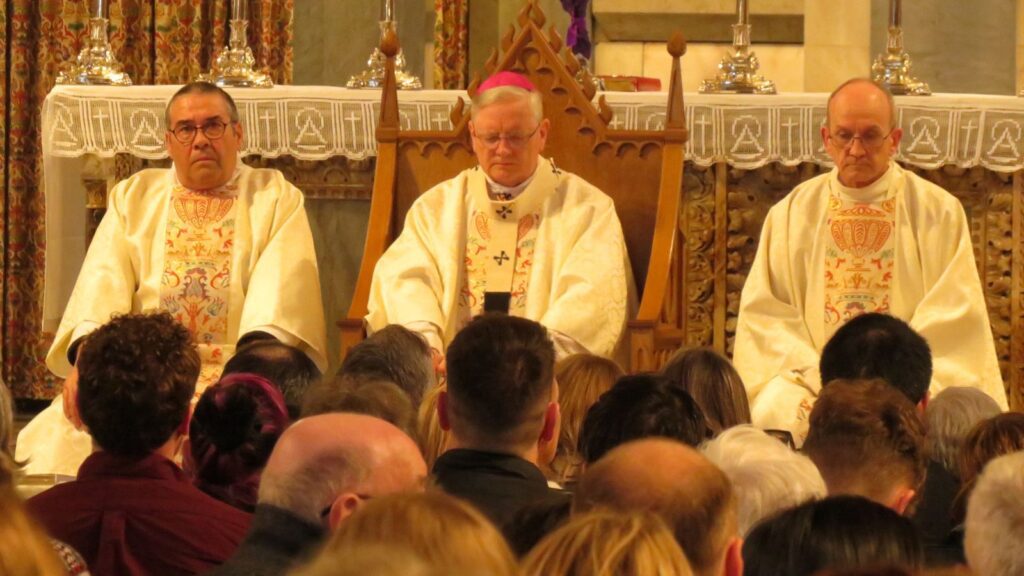Archbishop Cushley tonight celebrated Mass of the Lord's Supper, which marks the beginning of the Easter Triduum.
It is an important time for the Church because at the last supper Jesus instituted the Eucharist, the source and summit of our Faith.
Holy Thursday: The Blessed Sacrament is taken to the Altar of Repose at St Mary's Cathedral in Edinburgh. The Cathedral remains open for prayer at the Altar of Repose until 11:30pm. pic.twitter.com/H8p0U8597o
— Archdiocese of St Andrews & Edinburgh (@archedinburgh) April 17, 2025
He also washed the feet of his disciples as an example of loving service to others and that is what priests do at the Holy Thursday Mass.
Archbishop Cushley said: "Tonight we accompany Jesus on his way to Calvary.
"We anticipate his sacrifice on the Cross; we do so solemnly this evening in communion with him and with all Christians throughout the world; and we keep in mind its intimate links with what will take place tomorrow.
"Tonight, in the Eucharist, Jesus becomes for us not only food for the journey, but the very Way for us."
***
Homily of Archbishop Leo Cushley of St Andrews & Edinburgh, Mass of the Lord’s Supper, 17 April 2025
My dear friends,
Tonight we accompany Jesus on his way to Calvary.
We start with the Lord at table at the Last Supper, the origins of the celebration of the Eucharist so central to our memory of the Lord, keeping his memory alive and his presence among us in the Eucharist.
As Catholics, we see clearly the link between the Lord’s Supper and the Cross on Calvary and, knowing the trajectory of the story, we can see that it is a way that leads from the Upper Room, to Calvary, to the tomb, and indeed to the empty tomb.
And the whole three days are a kind of a “way”.
The Way
We sometimes refer to events tomorrow, Good Friday, in Jerusalem as the via Dolorosa or the via Crucis or the Way of the Cross.
But the term “the way” was also one of the very earliest equivalent names for “the Church”, and we find it in the Acts of the Apostles and elsewhere.
But the use of the word the “way” that we find even there, and about being faithful to the “way” has overtones of something else.
Clearly “the way” can suggest a manner of living, or a means to reach a place or purpose or object.
In that case, “the way” becomes an early stand-in for a word like “community” or “assembly”, it works well, and did so for a time in the early days of the Church.
But “the way” as a term also takes us back to something very important that Jesus says to the Apostles, while talking with Philip and Thomas at the last Supper, in fact tonight.
Just before the passage we heard in tonight’s gospel, Jesus says to the Apostles, “Let not your hearts be troubled; believe in God, believe also in me […] and you know the way where I am going”.
Thomas replies to this, “Lord, we don’t know where you’re going, so how can we know the way?” And Jesus replies, “I am the way, and the truth and the life; no one can come to the Father except through me.” He then turns to Philip and adds, “From now on you know the Father and you have seen him.”
Two essential things for us emerge from this that we ought to keep in mind across all these three days.
First of all, we should remember that Jesus is the Son of God and that in him we see God himself. To see him is to see God.
Not only that, this means that God himself is going to his death for us on Calvary tomorrow, and that he anticipates the sacrifice of the Cross here and now, at the Last Supper, tonight.
The second thing for us to keep in mind is that Jesus is the Way: he is God among his people, showing us, not just a way to live but a way to life, the way to life eternal in Jesus Christ.
This Way, the way to life, does not eliminate the pain of life or the necessity of death, but it transforms death from a dead end into a passage, a passing through death that leads us to life in Christ.
Food for the journey
One of the most beautiful rites that we have as Catholics is when we are able to receive holy Communion before we die.
The prayers are particularly powerful and describe the Eucharist as “food for the journey”, the journey through death and into life.
For this reason, we call it Viaticum, that is, quite literally, food for the journey. And tonight, we have a chance to see how this fits perfectly into our understanding of what the Lord does here at table, the night before he dies.
Our Eucharist tonight is viaticum, it is food for the journey, as we anticipate and associate ourselves with the Lord’s terrible and wonderful journey through suffering and death, and into life.
Tonight, then, Jesus anticipates his passage through death on the Cross tomorrow, in the Last Supper celebrated now.
In it, we can anticipate his sacrifice on the Cross; we do so solemnly this evening in communion with him and with all Christians throughout the world; and we keep in mind its intimate links with what will take place tomorrow.
Tonight, in the Eucharist, Jesus becomes for us not only food for the journey, but the very Way for us.
The Lord’s Supper tonight is not just a way to live but a way to life, the way to life eternal in Jesus Christ.
